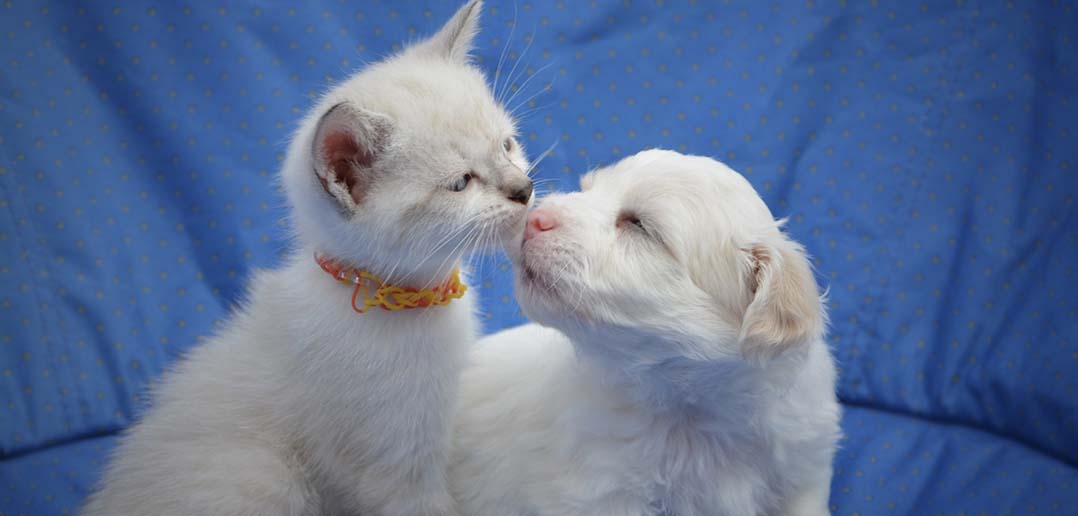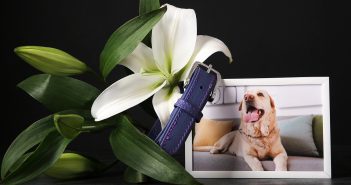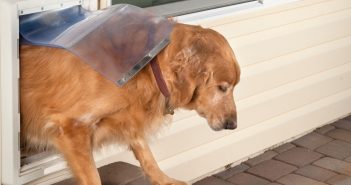Cats and dogs are more than animals — they’re furry, four-legged family members. And much like your human family, a pet can get into unwanted trouble around the home. Before you bring your newest best friend home, consider their specific needs and whether or not your home is a safe place for them to explore.
Kittens and puppies are naturally inquisitive, so it’s no surprise they wind up in hilarious — and sometimes dangerous — situations. Rest assured, any open kitchen cabinet will be thoroughly investigated, loose cables will be chewed on, and left out food will be devoured. Kittens and puppies simply don’t know what’s dangerous and what behaviors are okay. It’s up to you, or your older dog, to teach them. Until they learn, it’s your responsibility to remove any hazards they might encounter.
It’s important to learn about common home hazards for pets, and how a little planning can keep your pet safe and happy. When it comes to puppies and kittens, being proactive is always better than reactive. So here are a few things to keep in mind as you pet-proof your home before your new fur baby can safely trot through the front door.
Prepare To Housetrain
The biggest initial headache for new pet parents is properly training their fur ball. The American Humane Society has excellent advice for housetraining puppies and Whiskas, a cat food brand, gives great advice for housetraining kittens.
During initial training, accidents will happen. It’s best not to get upset about it and prepare for stains, smells and messes beforehand. If you have the opportunity, swap carpets for hardwood floors or install ceramic tile with dark grout lines that won’t show stains.
One thing to note, if you live in a very rainy or snowy environment, be careful installing tile because your pup or kitten might slip around and hurt themselves. This precaution is particularly important with older pets who have joint issues. The simplest solution is to put down runners on rainy or snowy days.
Avoid Poisonous Plants
Cat proofing your home can be trickier than keeping your dog safe. Cats love exploring and wedging themselves in high places or tight spots. Among the risks of a curious cat are common house plants. Cats love chewing on house plants and grass, some of which can cause stomach irritations, allergic reactions and even death. Know what plants are dangerous to cats and dogs and ensure your house and yard are free of the dangerous plants. If your cat insists on chewing things, then grow or purchase some cat grass.
Become An Animal
Your point of view is very different than what a cat and dog sees, so it’s easy to forget about nooks and crannies your pet might slip into. Crouch down to your hands and knees and wander throughout your home, thinking about all the places you’d love to explore as a cat or dog. Don’t forget to inspect areas your pet can get to by jumping or climbing.
Lock Up Cleaning Supplies
Cleaning products are often deadly to pets. It’s crucial to keep your cleaning products locked away in cabinets or lockers that have child-proof latches installed. Remember to check the laundry room and garage for any left-out chemicals, supplies or bottles.
Secure Medicines
Child-proof medicine containers aren’t chew-proof, so you must keep all medications — human and animal alike — in a secure cabinet. Never let your pet snag a dropped pill or capsule.
Keep Keepsakes Safe
Vigorous tail wagging, exploring cats and playtime eventually destroy fragile objects. Keep treasured objects or fragile decorations locked away in glass cabinets or in inaccessible areas.
Mind The Cords & Cables
If you’re done using an electrical appliance with a dangling cord, unplug it and secure the cord. If this isn’t viable, cover your cords and cables with a protective coat or bat-tasting non-toxic pet sprays. Cats love playing with hanging drapery and blind cords. It’s important to keep them wrapped up and out of reach. Your cat could die from strangulation or choking by playing with the cords.
Double Check Small Enclosures
Kittens, cats and puppies are the true hide-and-seek champions. Always double check inside the dryer or washer before closing the door, and keep appliances closed when not in use. Also, double check refrigerators, freezers and dresser drawers before closing them.
Unset The Table
Remove tablecloths from tables unless you are about to use them. New kittens who are curious about what’s up there on the table will try to climb the tablecloth. The result could be broken china and crystal—and an emergency trip to the veterinarian.
Close The Toilet Lid
Keep the toilet seats down. A kitten or puppy could clamber onto the toilet, fall in and be unable to escape.
Cover Dangerous Switches
If you have a garbage disposal switch or other dangerous built-in appliances, cover the activation switches with special covers from a hardware store. Cats are natural climbers and usually find their way to the kitchen sink and then play with play with electric switches, like the one for a garbage disposal. Obviously, this can end in disaster.
Secure Your Screens
Thwart your dog and cat from transforming into an escape artist and install secure, sturdy latches on screen doors and window screens.
Clip The Claws
Never declaw your cat or dog. It’s an awful mutilation that eliminates your pets’ defense options and creates various health and lifestyle problems. The better option is to clip your pet’s claws one-to-two times per month. If your pet goes outside frequently, the different environment will help trim their claws, so you won’t have as much work to do. Pets who are primarily indoors need frequent claw trimmings. Untrimmed claws can lead to infection, pain, and difficulty walking.
Taking care of a pet is a rewarding, heartwarming experience. The unconditional love a cat or dog offers is unlike anything else, so do your part and make sure your home is ready for your furry family member. For even more information, the American Humane Society has an excellent fact sheet about pet-proofing your home. Please ask your veterinarian or local animal shelter about specific safety questions.




